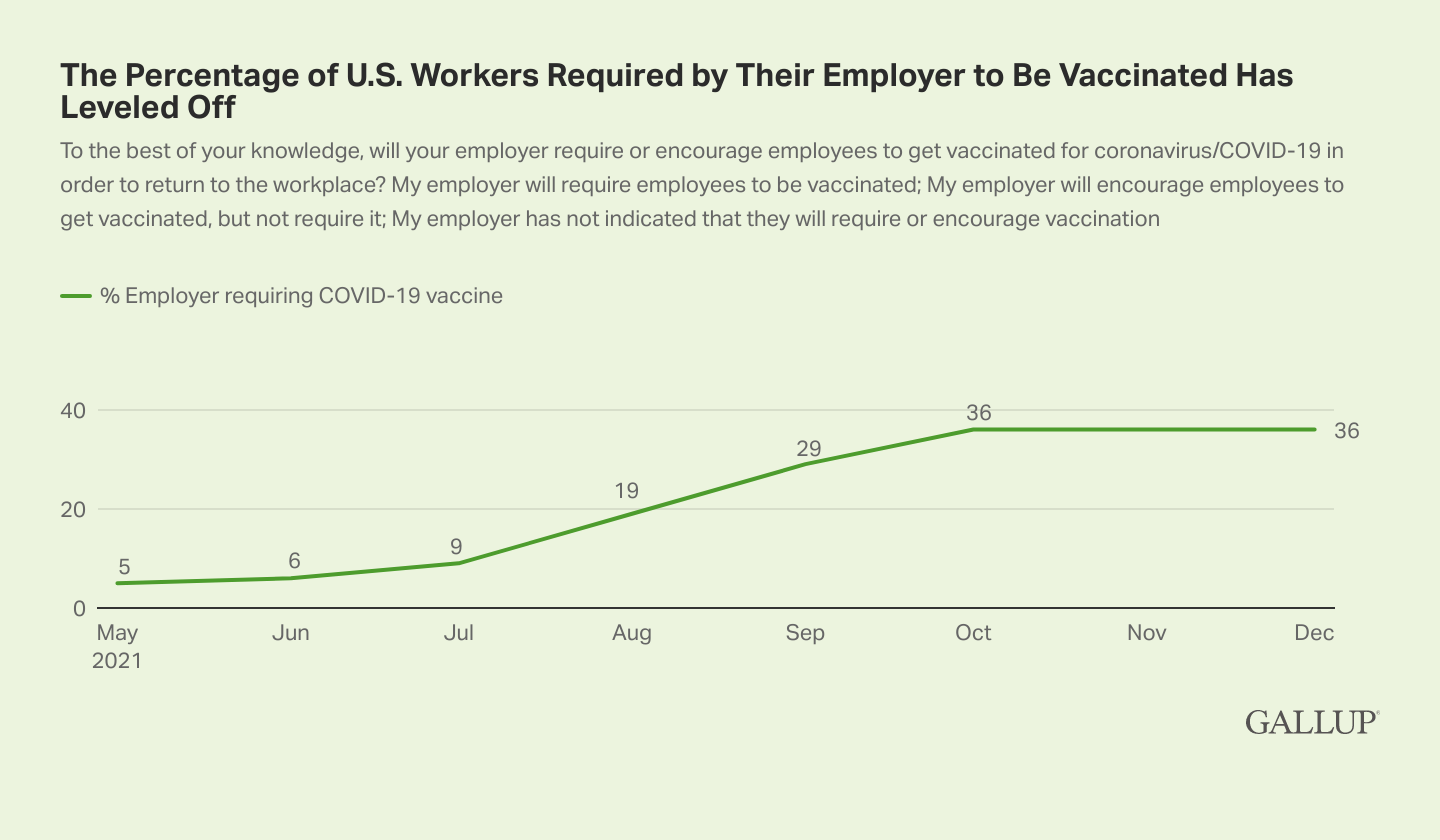Story Highlights
- 36% of U.S. workers say employer requiring vaccine
- Figure is stable after sharp increases in recent months
- One in five workers remain unvaccinated
WASHINGTON, D.C. -- The percentage of workers subject to employer COVID-19 vaccine requirements has steadied after showing significant increases in the late summer and fall. Currently, 36% of U.S. workers say their employer requires its employees to be vaccinated against COVID-19, unchanged from the last measurement in October.

Line graph. Trend in the percentage of U.S. workers who say their employer requires employees to get vaccinated against COVID-19. Currently, 36% of U.S. workers say their employer requires COVID-19 vaccination, unchanged from the prior reading in October. Between July and October, the percentage steadily grew from 9% to 19%, 29% and 36%.
The latest results are based on a Nov. 29-Dec. 5 update of Gallup's COVID-19 tracking survey, including interviews with a nationally representative sample of more than 2,000 employed adults who are members of the Gallup Panel.
The interviewing came after courts blocked President Biden's vaccine mandates for federal government workers and employees at large private companies pending further legal action. The pause in the mandate implementation could be one reason that employer vaccination requirements appear to be leveling off.
Meanwhile, 43% of U.S. employees say their employer is encouraging vaccination but not requiring it, down from 66% in May and 55% in August.
About one in five employees, 22%, say their employer has not indicated a preference on COVID-19 vaccinations for their workers, down from 29% in May.
Employees Generally Support Vaccine Requirements
Although vaccination mandates have been controversial, workers are much more likely to support than oppose them. Overall, 55% of U.S. workers favor vaccination requirements at work, while 35% are opposed and 11% do not have an opinion either way. Majorities of workers have been in favor since July, with a high of 58% recorded in September.
| May | June | July | Aug | Sept | Oct | Nov-Dec | |
|---|---|---|---|---|---|---|---|
| % | % | % | % | % | % | % | |
| Strongly favor | 29 | 33 | 36 | 41 | 46 | 45 | 43 |
| Favor | 17 | 16 | 16 | 11 | 12 | 11 | 12 |
| Neither favor nor oppose | 15 | 14 | 10 | 10 | 6 | 7 | 11 |
| Oppose | 8 | 7 | 9 | 7 | 7 | 7 | 6 |
| Strongly oppose | 31 | 30 | 29 | 31 | 29 | 30 | 29 |
| Total favor | 46 | 49 | 52 | 52 | 58 | 56 | 55 |
| Total oppose | 39 | 37 | 38 | 38 | 36 | 37 | 35 |
| Gallup | |||||||
Throughout Gallup's polling on the topic, most employees have held strong opinions on vaccine mandates. The percentage strongly opposed has consistently registered between 29% and 31% since May. Meanwhile, strong support has trended upward from 29% in May, exceeding 40% each month since August.
One in Five Workers Vaccine Resistant
Gallup estimates that 25% of U.S. workers are unvaccinated against COVID-19, the same proportion as the general population. Some workers -- totaling 5% -- are unvaccinated but say they plan to get vaccinated, leaving 20% who can be considered vaccine resistant.
Close to half of unvaccinated workers, 46%, say their employer has not indicated a policy on worker vaccinations. More in this group say their employer is encouraging vaccines (36%) than requiring them (20%).
In contrast, vaccinated workers overwhelmingly report their employer has a COVID-19 vaccine policy, with 40% saying vaccines are required and 45% saying they are recommended at their workplace.
With most unvaccinated workers not employed at jobs with vaccination requirements, the share of workers currently vulnerable to leaving their jobs over such policy disputes is relatively small. Gallup estimates that 5% of all U.S. employees are unvaccinated and work for an employer with a vaccination requirement.
| Percentage of all workers | |
|---|---|
| Employer requires, employee vaccinated | 31 |
| Employer requires, employee unvaccinated | 5 |
| Employer recommends, employee vaccinated | 35 |
| Employer recommends, employee unvaccinated | 8 |
| No policy, employee vaccinated | 11 |
| No policy, employee unvaccinated | 10 |
| Nov. 29-Dec. 5, 2021 | |
| Gallup | |
About half of the unvaccinated workers whose employer requires vaccines say they plan to get vaccinated, so presumably would comply when they need to. That leaves about 3% of unvaccinated workers currently subject to a mandate who don't plan to get vaccinated -- the most at risk of quitting their jobs over COVID-19 vaccine policy.
It is unclear what this group of workers will ultimately do -- decide to get vaccinated and continue in their job, secure an exemption so they could keep working without getting vaccinated, or quit their job and find a work arrangement that does not require them to be vaccinated.
Notably, the 5% of unvaccinated workers employed at organizations with vaccine requirements is the same now as in the prior survey from October. Coupled with the lack of change in the percentage of workers who say their employer requires vaccinations, this indicates that unvaccinated workers are standing pat at their job for now rather than leaving for jobs that don't require vaccinations.
Bottom Line
Since federal judges have put President Biden's vaccination mandates on hold, many unvaccinated workers who might be required by their employer to be vaccinated have more time to decide if they will agree to be vaccinated or find other work options.
Still, the percentage of workers who say they are required by their employer to be vaccinated has flattened after climbing steadily in recent months. The fate of the court challenges to vaccine mandates will determine whether more or fewer workers must comply with such mandates in the future.
The relatively small proportion of unvaccinated workers employed at jobs with vaccination requirements, compared with those employed at places without them, suggests that such mandates can be an effective way to get more Americans vaccinated.
To stay up to date with the latest Gallup News insights and updates, follow us on Twitter.
Learn more about how the Gallup Panel works.




